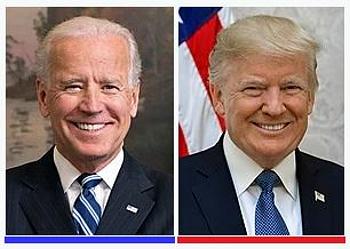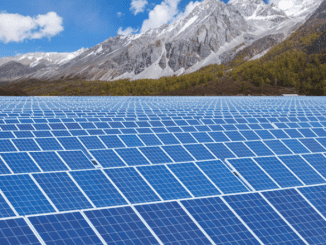
WASHINGTON, DC, November 8, 2020 (ENS) – Joseph R. Biden Jr. was declared President-elect of the United States on Saturday after slow, meticulous vote-counting that kept the nation on edge for four days. Biden, the Democrat from Delaware, who served as vice president under President Barack Obama, toppled the incumbent Republican President, Donald Trump, with the largest vote tally for any presidential candidate in U.S. history – over four million votes.

Vote counting continues in Pennsylvania, Arizona, Nevada and Georgia, but Biden has the lead in all four states. Trump, who needed to flip three of them to win the White House, has refused to concede the election, but that is a formality not required under the U.S. Constitution.
Biden and his running mate the junior U.S. Senator for California Kamala Harris, won more than 270 Electoral College votes, sailing across the threshold that assures a presidential victory.
The multi-racial Harris whose mother immigrated from India and her father from Jamaica has made history as the first woman, the first Black and the first South Asian to fill the role of vice president-elect of the United States.
They have campaigned on a strong climate restoration platform, starting with bringing the United States back into the Paris Climate Agreement on day one of a Biden administration.
Now, after winning the election, they still intend to carry out their plan. Biden tweeted November 4, “Today, the Trump Administration officially left the Paris Climate Agreement. And in exactly 77 days, a Biden Administration will rejoin it.”
The United States will be welcomed back into the Paris Accord, said the governments of Chile, France, Italy, the UK and the UN Climate Change agency, in a Joint statement November 4.
“On 12 December we will be celebrating the five year anniversary of the Paris Agreement,” they said. “We note with regret that the US withdrawal from the Paris Agreement has formally come into effect today. As we look towards COP26 in Glasgow, we remain committed to working with all US stakeholders and partners around the world to accelerate climate action, and with all signatories to ensure the full implementation of the Paris Agreement.”

The Paris Accord, unanimously adopted by world governments in 2015, is a voluntary framework for efforts to hold the global temperature rise to well below 2 degrees Celsius and make best efforts to limit warming to 1.5 degrees C.
“The US withdrawal has huge implications for the rest of the world in terms of tackling the climate crisis. The US leaving the Paris climate agreement demonstrates what’s at stake in this election,” said May Boeve, executive director of the international nonprofit climate advocacy group 350.org.
Boeve said, “The next four years play a critical role in the fight to tackle the climate crisis. The United States is the second-largest emitter worldwide and its promised emissions cuts accounted for about 20 percent of global reductions. The US directly subsidizes the fossil fuel industry approximately US$20 billion per year.”
“What we need now is all hands on deck for global climate leadership,” Boeve said. “If the US exit from the Paris climate deal became permanent, it would threaten to further weaken its enforcement measures and undermine the resolve of other countries to make their own tough cuts.”
In his victory speech Saturday night, Biden said he is prepared to “marshal the forces of science and the forces of hope in the great battles of our time,” including, “The battle to save the climate.”
In the Climate Plan on his campaign website, Biden pledges to, “Rally the rest of the world to meet the threat of climate change” … “a global challenge that requires decisive action from every country around the world.”
Biden will not only recommit the United States to the Paris Agreement on climate change, he promises to “lead an effort to get every major country to ramp up the ambition of their domestic climate targets. He will make sure those commitments are transparent and enforceable, and stop countries from cheating by using America’s economic leverage and power of example. He will fully integrate climate change into our foreign policy and national security strategies, as well as our approach to trade.”
Does He or Doesn’t He Support the Green New Deal?
Biden said during the first debate against President Trump that he doesn’t support the Green New Deal, but his campaign site says he does.
The Biden Climate Plan as posted on the Biden campaign website states, “Biden believes the Green New Deal is a crucial framework for meeting the climate challenges we face. It powerfully captures two basic truths, which are at the core of his plan: (1) the United States urgently needs to embrace greater ambition on an epic scale to meet the scope of this challenge, and (2) our environment and our economy are completely and totally connected.”
Click here to see the entire Biden Climate Plan. Biden can be expected to follow this plan, which pledges to:
Ensure the U.S. achieves a 100% clean energy economy and reaches net-zero emissions no later than 2050.
On day one, Biden will sign a series of new executive orders with an unprecedented reach that go well beyond the Obama-Biden Administration platform.
He promises to demand that Congress enact legislation in the first year of his presidency that:
1) establishes an enforcement mechanism that includes milestone targets no later than the end of his first term in 2025,
2) makes a historic investment in clean energy and climate research and innovation,
3) incentivizes the rapid deployment of clean energy innovations across the economy, especially in communities most impacted by climate change.
On day one, Biden pledges to make “smart infrastructure investments to rebuild the nation and to ensure that our buildings, water, transportation, and energy infrastructure can withstand the impacts of climate change. Every dollar spent toward rebuilding our roads, bridges, buildings, the electric grid, and our water infrastructure will be used to prevent, reduce, and withstand a changing climate,” his climate plan states.
Biden says he will, “take action against fossil fuel companies and other polluters who put profit over people and knowingly harm our environment and poison our communities’ air, land, and water, or conceal information regarding potential environmental and health risks.”
The Biden plan will ensure that “communities across the country from Flint, Michigan to Harlan, Kentucky to the New Hampshire Seacoast have access to clean, safe drinking water. And he’ll make sure the development of solutions is an inclusive, community-driven process.”
And, Biden has committed that his campaign would not accept contributions from oil, gas and coal corporations or executives.
Biden plans to make a historic investment in America’s clean energy future and environmental justice, paid for by rolling back the Trump tax incentives that the president-elect says enrich corporations at the expense of American jobs and the environment.
Biden’s climate and environmental justice proposal will make a federal investment of $1.7 trillion over the next ten years, leveraging additional private sector and state and local investments to total to more than $5 trillion.
Young Voters Power Biden/Harris Victory
Climate change and other environmental issues were important to voters who turned out for Biden and Harris, particularly young voters.
Young people turned out in large numbers across the country and were instrumental in the victory of President-elect Joe Biden and the first female vice president-elect.

Data from the Center for Information & Research on Civic Learning & Engagement, CIRCLE, at Tufts University shows that more than 10 million youth cast early and absentee ballots. When all votes are counted CICLE says that youth voter turnout number could hit 56 percent.
Young voters, who nationwide preferred Biden by a 25-point margin (61 percent to 36 percent), were critical in the key battleground states that decided the presidential contest.
In Michigan, 62 percent of youth backed Biden, just 35 percent for Trump, giving Biden an edge of an estimated 194,000 youth votes, higher than the 148,000-vote margin of victory in the state.
In Georgia, where Biden and Trump are closely matched and recounts are scheduled, Biden received an estimated 188,000 more votes from youth than Trump did.
In Arizona, young people preferred Biden by 24 points.
In Pennsylvania, Biden leads by just under 35,000 votes as of Saturday morning when the state—and the presidential race—were called in his favor. Biden got an estimated 154,000 more youth votes than Trump did in the state.
Young people of color played an especially critical role. While white youth voted for Biden by a slim margin – 51 percent to 45 percent – youth of color gave him overwhelming support, ranging from 73 percent among Latino youth to 87 percent among Black youth. In fact, CIRCLE projected, “in states like Georgia and Arizona, Black and Latino youth may have single-handedly made Biden competitive.”
Biden Plans to Reverse Trump’s Energy Orders
The Biden administration is expected to immediately rescind many of Trump’s executive orders on energy that permitted more pollution of land, air and water and higher emissions of greenhouse gases than the previous Obama administration had allowed.
Biden has signaled that he will sign executive orders directing agencies to develop new methane limits for oil and gas wells, to reinstate and strengthen fuel economy standards, and to tighten efficiency standards for appliances and buildings.
And it is likely that the Biden administration will work to include clean energy provisions in any coronavirus economic stimulus measures that Congress passes.
Copyright Environment News Service (ENS) 2020. All rights reserved.
© 2020, Environment News Service. All rights reserved. Content may be quoted only with proper attribution and a direct link to the original article. Full reproduction is prohibited.



